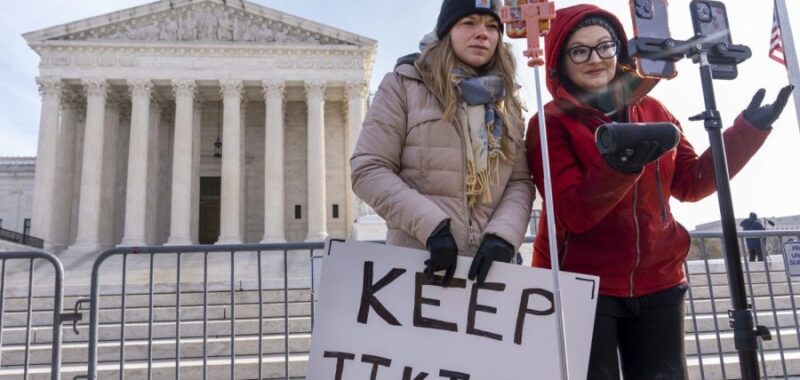
In a pair of cases heard this month, the Supreme Court has faced collisions between the First Amendment’s right to speech and the unprecedented dangers presented by the internet and social media.
The justices must decide whether to give legislatures the benefit of the doubt when it comes to laws aimed at protecting Americans from Chinese data manipulation on the one hand, and preventing children’s access to online pornography on the other — or whether to step in as the nation’s top policy czars. So far, the court seems to be ably striking a balance.
Both cases involve novel technologies that did not exist when the First Amendment was ratified in 1791. Looming in the background, therefore, is the question of how far the court will take the First Amendment for purposes of protecting the rights of online and social media corporations — which it found in Citizens United have free speech rights — even in the face of evidence that their platforms cause harm to the public. By the same token, the cases present the question of whether legislatures can impose reasonable restraints on access to the internet and social media. The implications are vast.
On Jan. 15, the court heard oral arguments in Free Speech v. Paxton, a First Amendment challenge to Texas’s law H.B. 1181, which requires commercial pornographic websites to verify that visitors are at least 18 years old before they can view pornographic content. Nineteen states have passed similar laws, reportedly pushed by groups associated with Project 2025, the controversial Heritage Foundation policy blueprint for President Donald Trump’s second term.
The precise question before the Supreme Court has to do with the legal test that applies, as Justice Sonia Sotomayor described it, “when content can be obscene as to children, but not obscene as to adults.” Both sides agreed that online pornography is bad for kids — the question is how high to put the First Amendment bar before the government can pass laws mitigating those harms.
In 1969, the court held in Stanley v. Georgia that individuals have a First Amendment right to view pornography in their own homes. In the Texas case, producers of pornographic content and other challengers of the law claim that adults’ free speech right to access porn will be harmed if they have to first turn over identifying information about their age.
The challengers also argued that content filters are sufficient to protect children. Justice Samuel Alito pushed back, asking counsel: “Do you know a lot of parents who are more tech-savvy than their 15-year-old children?”
It’s difficult to live in 2025 and deny the implications of Alito’s question. The internet is a restriction-free zone, and our kids know it. If a majority of the court upholds the Texas law, we can expect legislatures to feel emboldened to enact more laws that affect the First Amendment rights of social media and online companies and their users, ostensibly in the interests of the public.
In TikTok v. Garland, the court on Friday upheld a law passed by Congress that banned companies such as TikTok from being owned by China-adjacent companies (such as TikTok’s parent company, ByteDance) out of concern that a foreign adversary’s collection of Americans’ data threatens national security. The court, in a per curiam opinion (meaning no justice took credit for authoring it), emphasized that the law is not targeting speech but “preventing China from collecting vast amounts of sensitive data from 170 million TikTok users,” including “age, phone number, precise location, internet address, device used, phone contacts, social network connections, the content of private messages sent through the application, and videos watched.”
The ruling was an unmistakable nod to Congress. Coming from this right-leaning court, that’s saying something, because in other contexts — such as under the Second Amendment — it has not hesitated to step in and slap down the work of legislatures.
But the court’s delicate balancing of the separated powers in the TikTok case could be short-lived. On Sunday, Trump came to TikTok’s rescue, posting on Truth Social that “I will issue an executive order on Monday to extend the period of time before the law’s prohibitions take effect, so that we can make a deal to protect our national security. The order will also confirm that there will be no liability for any company that helped keep TikTok from going dark before my order.”
TikTok, after shutting down for several hours, invited users back, bizarrely crediting Trump: “Thanks for your patience and support. As a result of President Trump’s efforts, TikTok is back in the U.S.!”
Kimberly Wehle is author of the new book “Pardon Power: How the Pardon System Works — and Why.”

